Source: https://doi.org/10.6084/m9.figshare.24921153.v1
Dive deep into enhancing your academic work's reach and influence using AI technologies.
🔗 Access this insightful presentation here: https://doi.org/10.6084/m9.figshare.24921153.v1
"Virtual Teams will become as important as Web to companies" (Nader Ale Ebrahim)
Source: https://doi.org/10.6084/m9.figshare.24921153.v1
Dive deep into enhancing your academic work's reach and influence using AI technologies.
🔗 Access this insightful presentation here: https://doi.org/10.6084/m9.figshare.24921153.v1
Source: https://doi.org/10.6084/m9.figshare.24919680.v1
🚀 New Presentation Alert: "Leveraging AI-Based Tools to Increase
Research Visibility & Impact" by Nader Ale Ebrahim🤖💡
Source: https://doi.org/10.6084/m9.figshare.24717672.v1
Authored by Nader Ale Ebrahim
Published on 2023-12-03
In the first part of our series, we discussed the importance of enhancing research visibility to climb the academic rankings ladder. As we move to Part 2, we delve further into the practical tactics and tools that can help universities and researchers showcase their work more effectively and increase their impact in the academic world.
Research, regardless of its quality, can often remain unseen in the vast ocean of academic publications. The key to overcoming this challenge is strategic visibility. This segment of the workshop, led by me, Nader Ale Ebrahim, focuses on actionable strategies and innovative 'Research Tools' designed to elevate the presence of your research in the academic community.
Creating Impactful Online Profiles: Building on the concept of online academic profiles, this part will cover advanced techniques to optimize these profiles, ensuring they capture the essence of the research and the researcher effectively.
Networking and Collaborative Synergies: We'll explore deeper into creating meaningful collaborations and how these partnerships can lead to greater research visibility and higher citation rates.
Selective and Strategic Publishing: Going beyond just choosing the right journals, this part will discuss how to leverage your research publications to establish authority and thought leadership in your field.
Social Media as a Research Dissemination Tool: Harnessing the power of social media requires more than just sharing; it's about engaging with the audience, storytelling, and creating a narrative around your research.
This workshop is grounded in practicality. It's not just about theory; it's about equipping you with tangible tools and strategies. We will delve into various 'Research Tools' that can be seamlessly integrated into your research dissemination strategy, ensuring that your work not only reaches but also resonates with your target audience.
To complement the workshop, we reference materials like "Elevating Research Visibility and Impact: Strategies for Izmir Institute of Technology (İYTE)" and "How to Elevate Research Visibility and Impact." These resources provide additional insights and are instrumental in understanding the broader context of our discussion.
As we wrap up Part 2 of this series, our goal remains clear: to empower universities and researchers with the skills and knowledge to significantly increase the visibility and impact of their research. By applying these strategies, we can collectively contribute to the academic success and elevate the standing of institutions in global rankings.
Stay tuned for more insights and tools that will help bring your research to the forefront of academic excellence.
Source: https://doi.org/10.6084/m9.figshare.24717675.v2
Authored by Nader Ale Ebrahim
Published on 2023-12-03
Universities are constantly striving to climb up the ladder in academic rankings, and one of the most effective ways to achieve this is by amplifying the visibility and impact of their research. In this era of information overload, even top-tier research can struggle to get the attention it deserves. This is where strategic dissemination of research plays a crucial role.
While groundbreaking studies, akin to those recognized by the Nobel Prize, naturally capture the spotlight, the reality is that most research does not operate at this echelon. The majority of scholarly work requires additional efforts to be seen and make a significant impact. This is where the challenge lies – how can universities enhance the visibility of their research to improve their standings in global academic rankings?
In this workshop, I, Nader Ale Ebrahim, a specialist in Research Visibility and Impact, will delve into practical strategies that can elevate the status of universities in academic rankings through enhanced research visibility. Here are some key areas we will explore:
Creating Strong Online Academic Profiles: Establishing robust online profiles for universities and their researchers is a foundational step. Platforms like Google Scholar, ResearchGate, and LinkedIn play a pivotal role in showcasing academic work to a global audience.
Collaborative Endeavors: Networking and collaborating with fellow researchers and institutions can significantly amplify the reach and impact of research. It fosters a sharing ecosystem, leading to increased citations and recognition.
Strategic Publication and Dissemination: Choosing the right journals and conferences to publish research is critical. Open Access publishing and attending impactful conferences can boost visibility and citations.
Leveraging Social Media: Social media platforms are powerful tools for disseminating research findings. They offer a direct channel to engage with a broader audience, including academia, industry, and the public.
This workshop is not just a theoretical exposition; it is packed with practical, easy-to-implement advice and tools designed to make your research stand out. I will introduce various 'Research Tools' that can aid researchers and universities in effectively showcasing their work, thus enhancing its visibility and impact.
The ultimate goal of this workshop is to equip universities and researchers with the knowledge and tools necessary to make their research more visible. By doing so, they can significantly improve their position in university rankings, contributing to the overall prestige and recognition of their academic endeavors.
Stay tuned for more insights and practical tips as we continue this journey in the realm of academic excellence.
Source: https://doi.org/10.6084/m9.figshare.24433723.v1
In the ever-evolving landscape of academic research, librarians and researchers are stepping into roles that extend beyond traditional boundaries. They are the torchbearers of academic excellence, and the key to their success lies in the harnessing of cutting-edge technology, particularly Artificial Intelligence (AI). Join us in an exploration of the transformative power of AI in our upcoming talk at the WITS OPEN RESEARCH SERIES.
Source: https://cope.uobaghdad.edu.iq/?p=38195
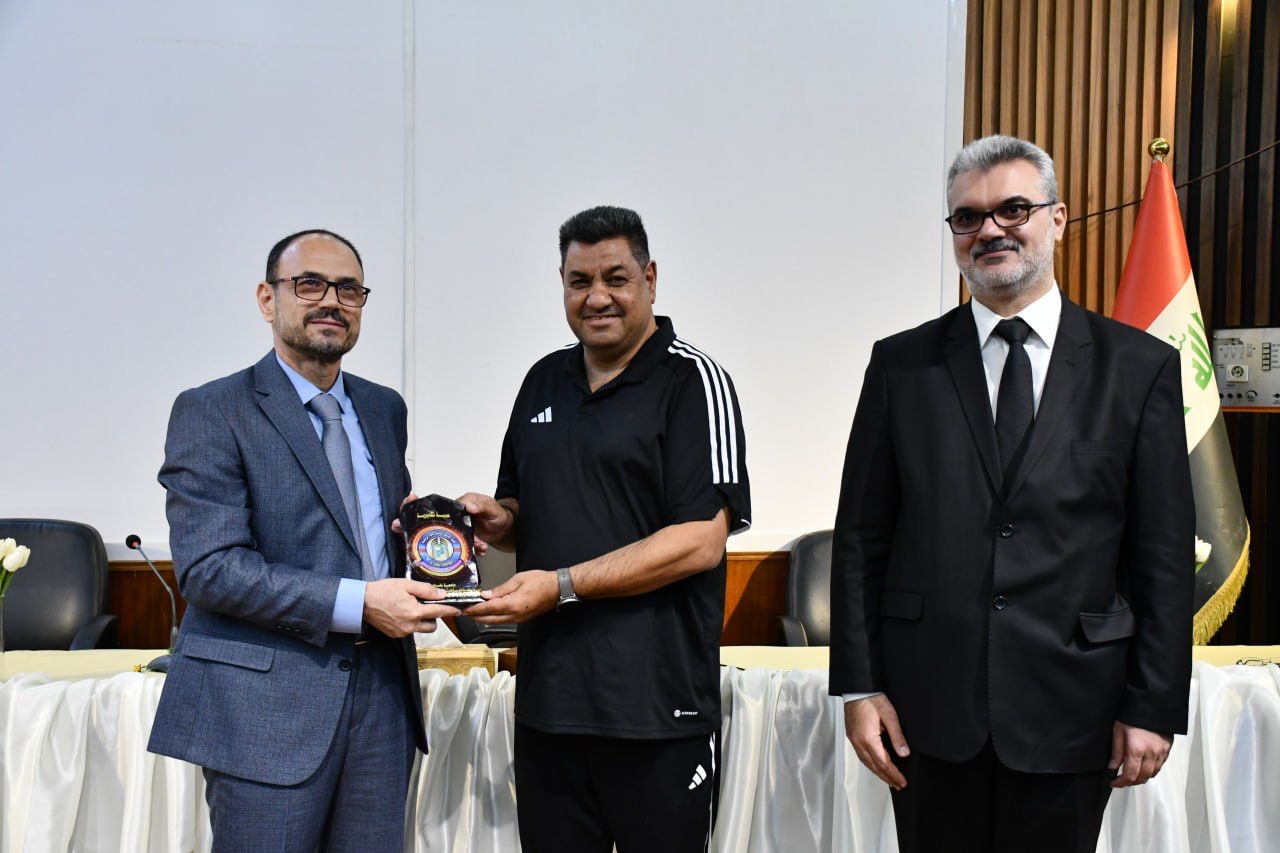
استضافت كلية التربية البدنية وعلوم ورشة العمل بعنوان (السمعة الاكاديمية في التصنيفات الدولية) يوم الأربعاء الموافق (٢٠٢٣/١٠/١٧) على قاعة المناقشات الكبرى القاها الدكتور ( نادر ال ابراهيم ) من الجمهورية الاسلامية الايرانية الخبير في البحث العلمي و تصنيفات الجامعات
بحضور السيد مساعد رئيس الجامعة للشؤون
العلمية الاستاذ الدكتور ( مروان عبدالحميد عاشور ) و السيد عميد الكلية
الاستاذ الدكتور ( صباح قاسم خلف ) و السيد مدير قسم ضمان الجودة في رئاسة
الجامعة الدكتور ( عمر فالح ) فضلا عن حضور السادة عمداء الكليات و المعاهد
و مدراء شعب ضمان الجودة في التشكيلات كافة.
وتم التطرق في الورشة الى التعريف بأدوات ادارة محور السمعة الاكاديمية في
التصنيفات الدولية وما يتعلق به من جوانب تخص البحث العلمي وكيفية الارتقاء
بها.
وفي نهاية الورشة قدم السيد عميد الكلية هدية تذكارية الى الدكتور (نادر ال
ابراهيم) تعبيراً عن أمتنان عمادة الكلية لاقامة هذه الورشة.
Comments are disabled.
Source: https://nc.uobaghdad.edu.iq/?p=86655
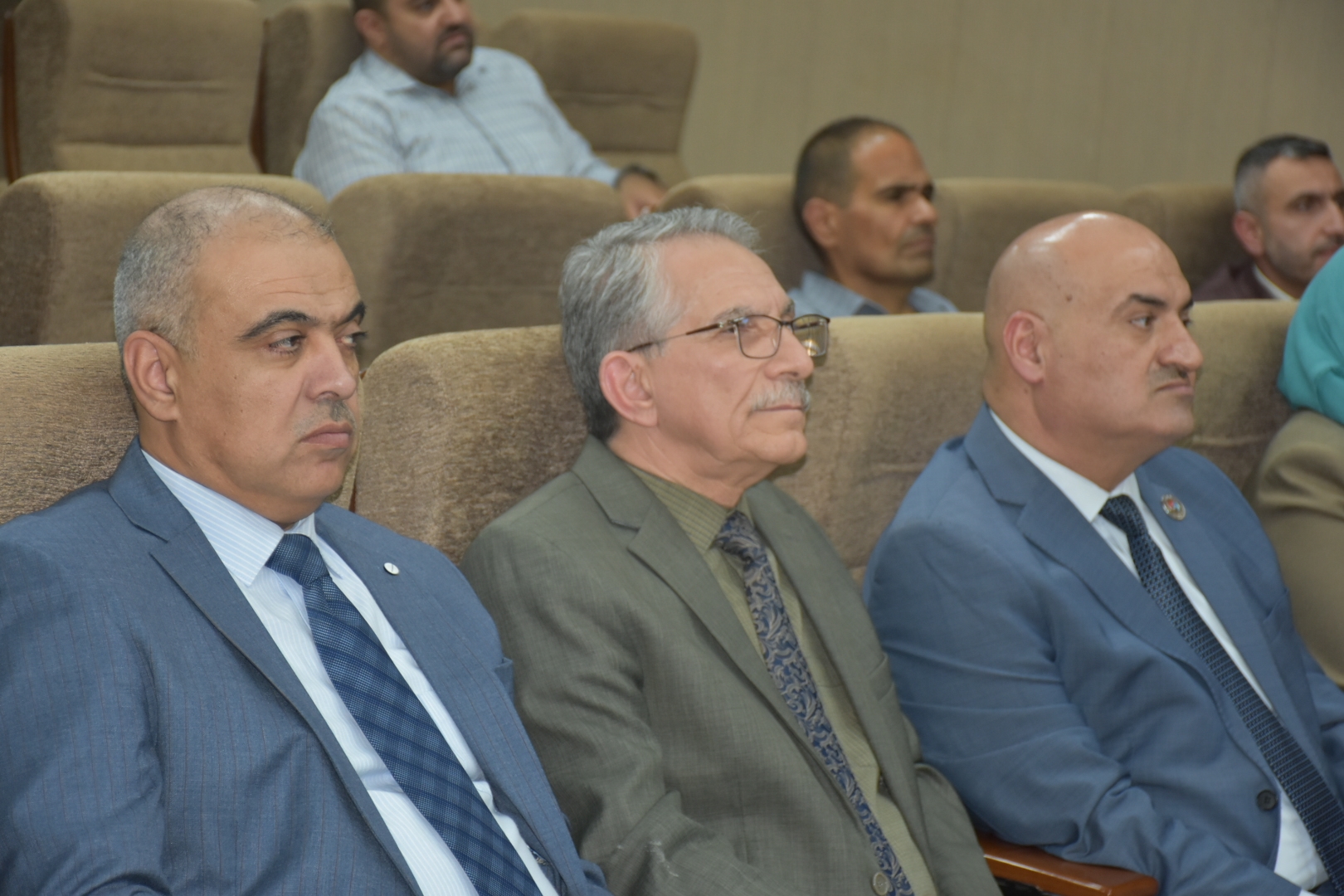
استضافت جامعة بغداد ورشة عمل عن رفع تصنيف الجامعات عالميا ، على قاعة مهدي حنتوش بكلية الهندسة والتي القاها الخبير في البحث العلمي و تصنيفات الجامعات في الجمهورية الاسلامية الايرانية الأستاذ الدكتور نادر آل ابراهيم، وبحضور وكيل وزارة التعليم العالي والبحث العلمي للشؤون العلمية الدكتور حيدر عبد ضهد والاستاذ الدكتور مروان عاشور مساعد رئيس الجامعة للشؤون العلمية والدكتور عمر فالح حسن مدير قسم ضمان الجودة والاداء الجامعي في الجامعة .
وتم التطرق في الورشة إلى التعريف بأدوات البحث العلمي ومحور إدارة السمعة الاكاديمية في التصنيفات الدولية وما يتعلق بهِ من جوانب تخص البحث العلمي وكيفية الارتقاء بها لوصول الجامعة إلى تصنيفات متقدمة، والآليات المتبعة لرفع تصنيف الجامعات من خلال البحوث والاستشهادات والمستوعبات العالمية .
وتأتي هذه الورشة ضمن سلسلة ورشات تحتضنها جامعات بغداد للارتقاء بتصنيف الجامعة عالميا وتطوير جودة البحث العلمي خدمة للعملية التعليمية ولبلدنا العراق .
Source: https://en.uobaghdad.edu.iq/?p=43853
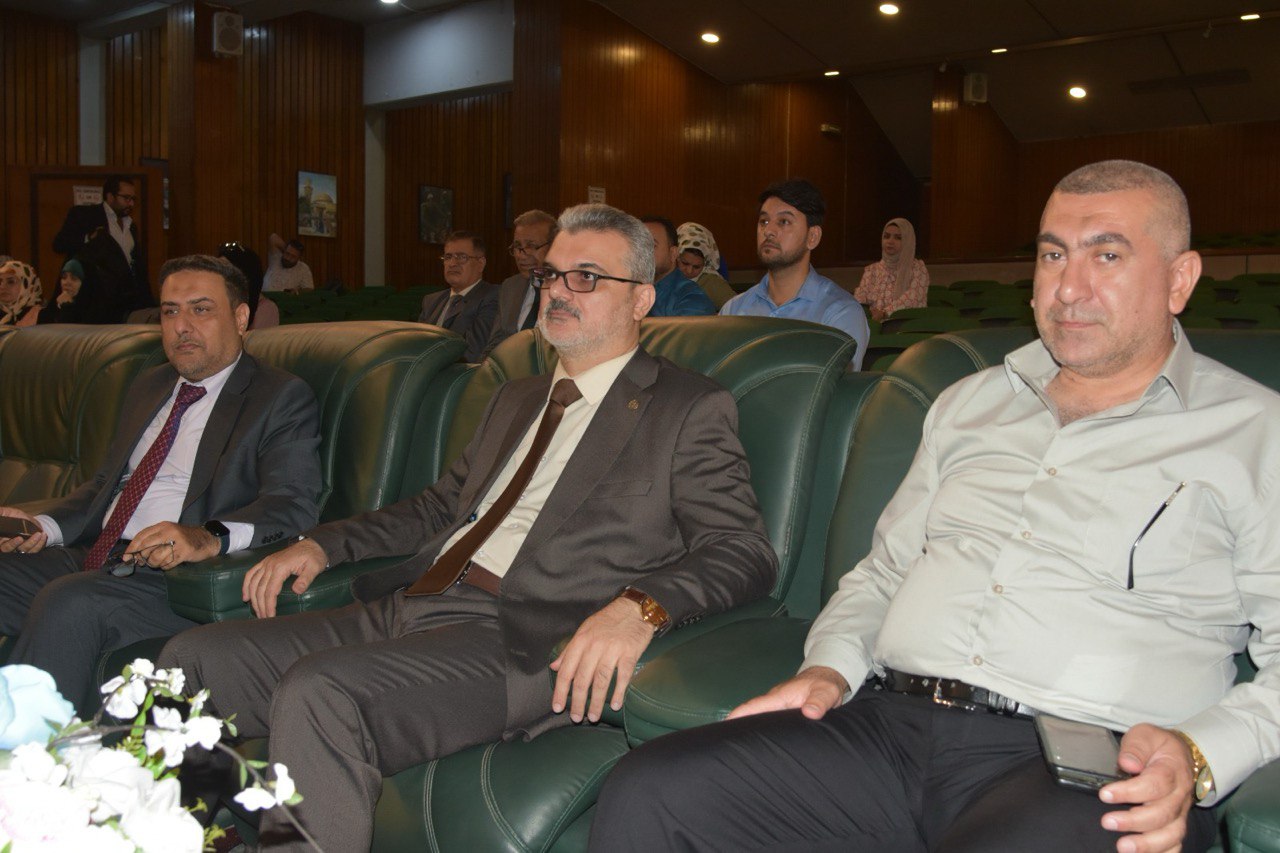
The University of Baghdad organized a workshop in collaboration with Al-Zahraa University from the Islamic Republic of Iran, aiming to enhance the culture of research, scientific publishing, citation, and visibility for Iraqi researchers and faculty. The event was attended by the Assistant Rector for Administrative Affairs, Prof.Dr. Amir Faisal Abdul Amir, and the Assistant Rector for Scientific Affairs, Prof.Dr. Marwan Abdul Hamid.
Prof.Dr. Marwan praised the nature of this collaboration, highlighting its potential to improve the quality and impact of scientific research in international rankings. The workshop hosted Professor Nader Al-Ibrahim from Al-Zahraa University, under the guidance of the Undersecretary of the Ministry of High Education for Scientific Affairs, Dr. Haider Abd Dahed. This initiative aims to enhance the competence of professors and students by improving the quality and impact of scientific research in international rankings for faculty members and students across Iraq.
In turn, the Scientific coordinator for the Office of the Undersecretary, Dr. Adi Ali, reported that this collaboration will proceed in two phases: the first phase took place at Al-Kut University over two days, while the second phase will occur at the University of Baghdad over four days. The initial lecture focused on theoretical definitions, with upcoming days incorporating practical applications for students in laboratories.
It’s worth mentioning that this workshop conducted in collaboration with Dr. Nader Al-Ibrahim, is not the first of its kind, previous workshops were conducted virtually. However, this time the Ministry decided to make it in-person to enhance the visibility of Iraqi researchers in scientific publications.
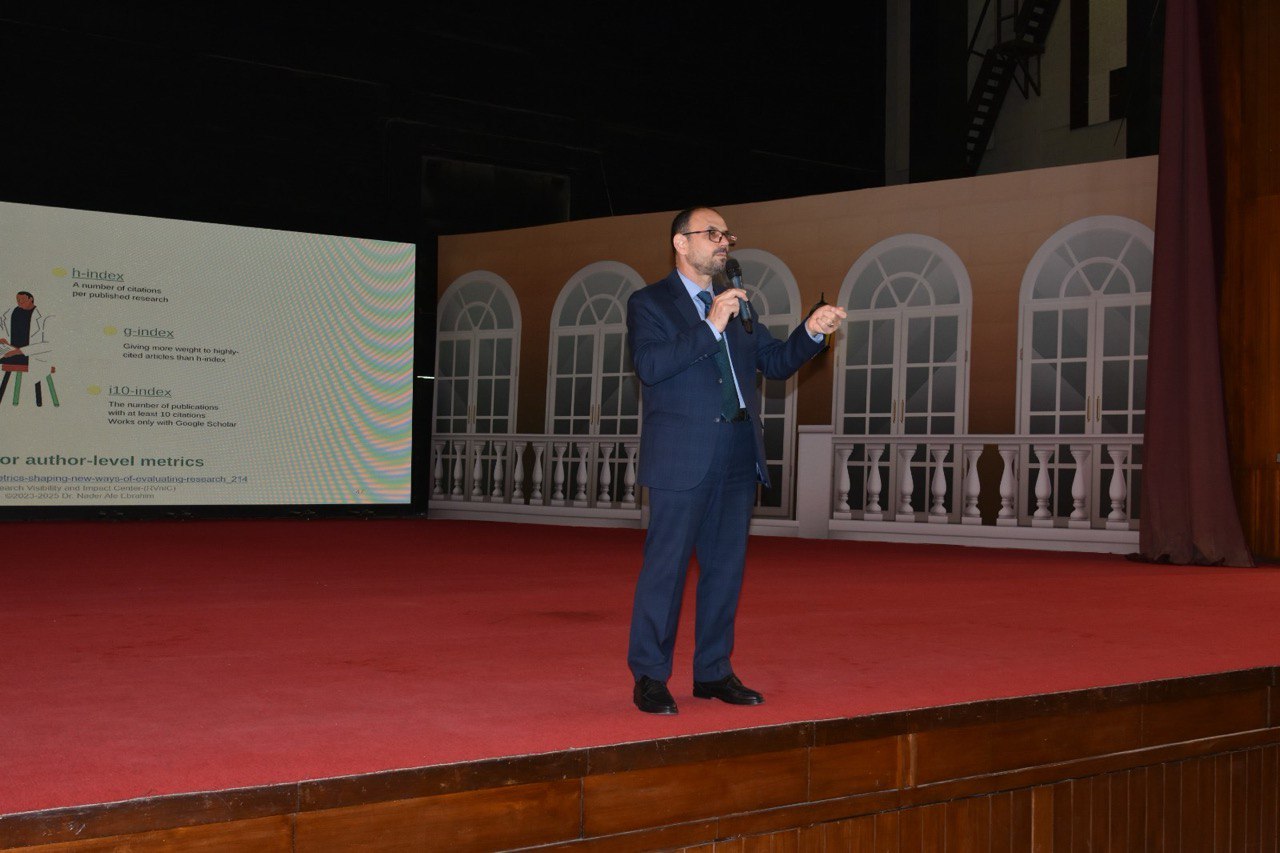
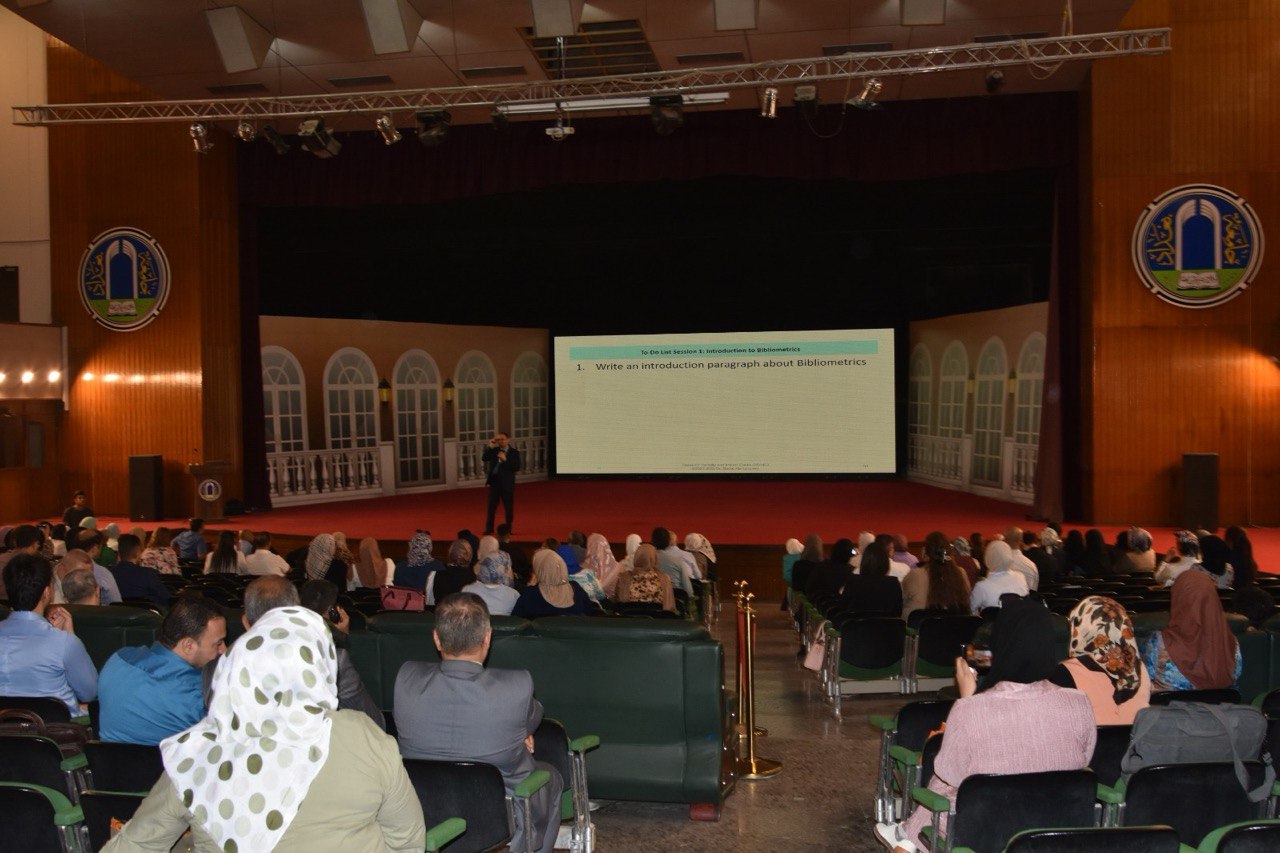
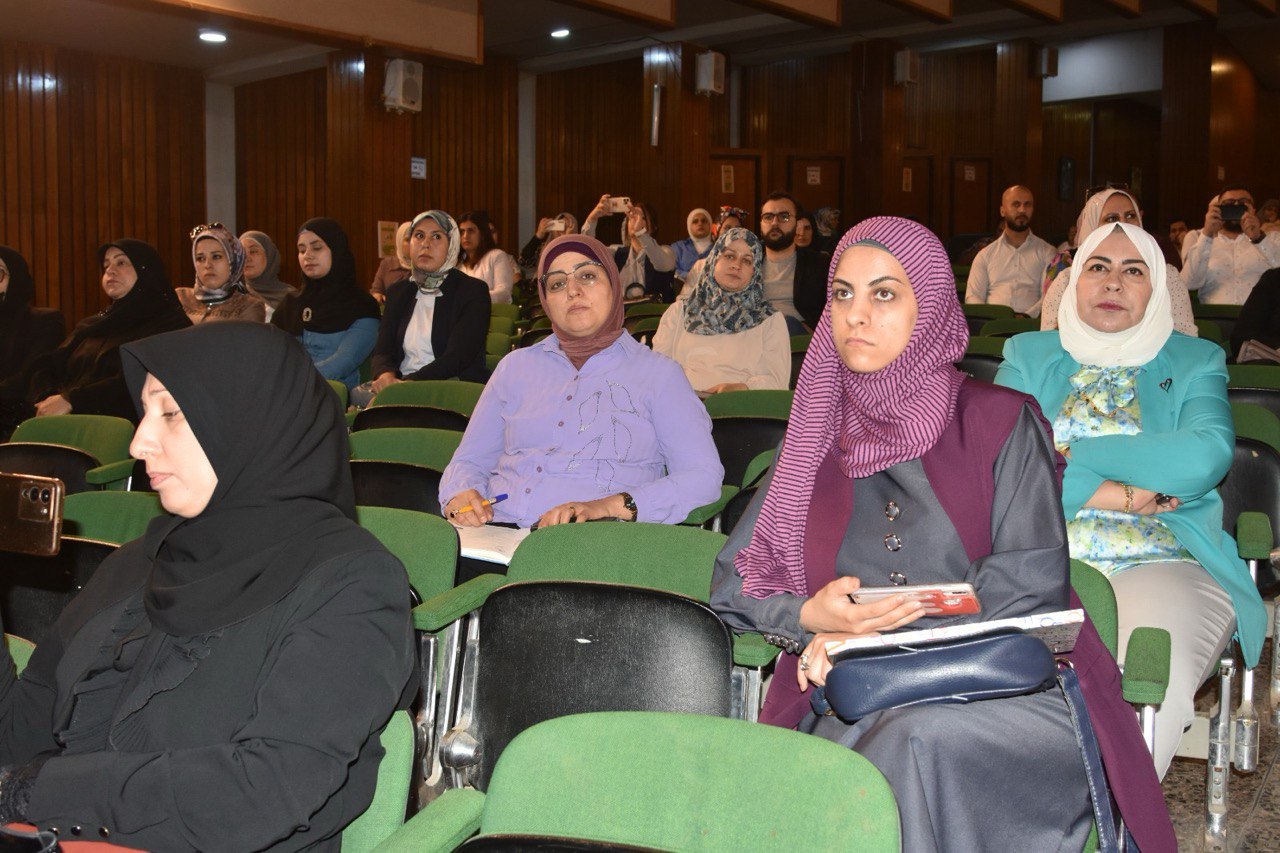
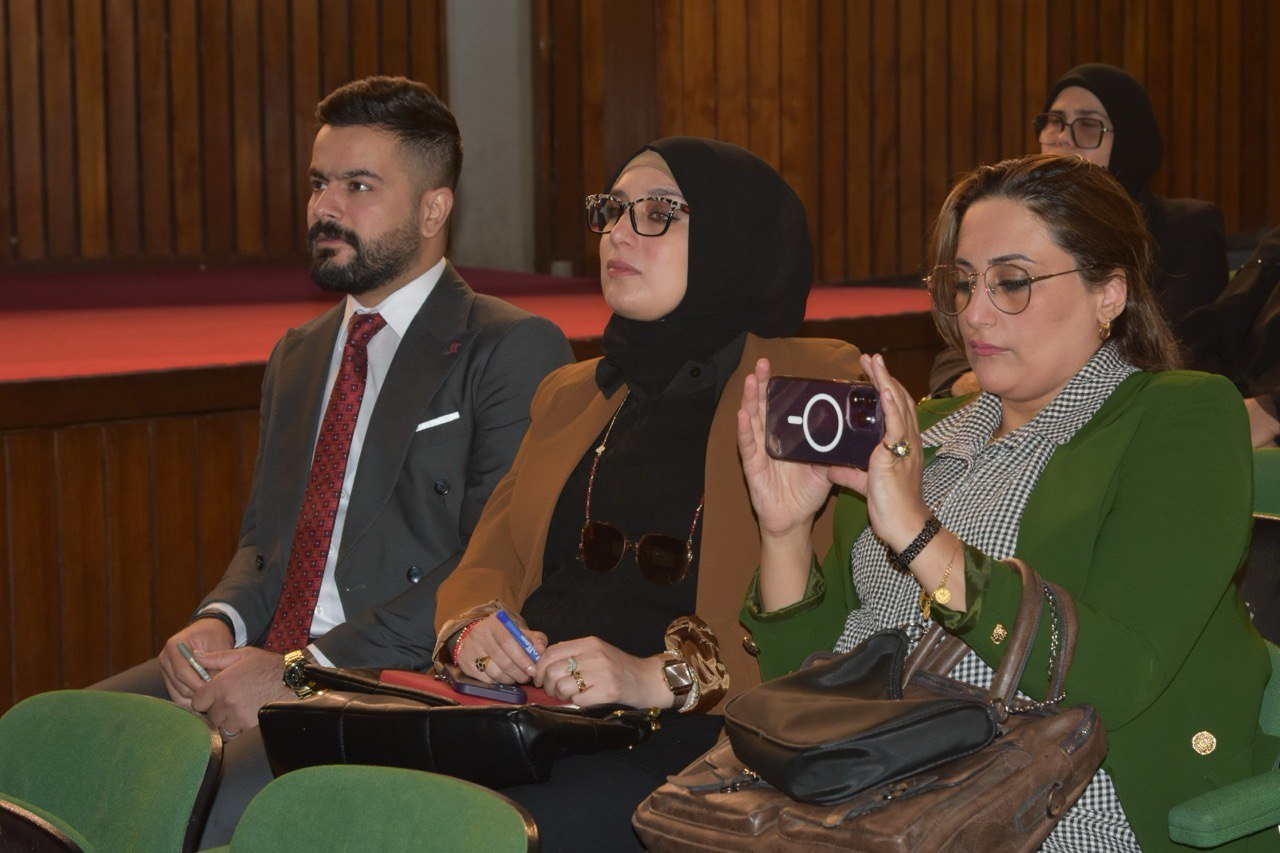
Source: Ale Ebrahim, Nader (2023). Elevating Research Visibility and Impact: Strategies for Izmir Institute of Technology (İYTE). figshare. Presentation. https://doi.org/10.6084/m9.figshare.24103539.v1
Source: https://doi.org/10.6084/m9.figshare.24086157.v1
Title: Harnessing AI to Elevate Research Visibility and Impact: Empowering Librarians
In today's dynamic academic research landscape, librarians have evolved into integral players, far beyond their traditional roles. The journey of enhancing research visibility and impact has taken an exciting turn, and artificial intelligence (AI) is the compass guiding the way. This blog post unveils the transformative potential of AI in academia, with a special focus on the vital contributions of librarians.
Source: https://doi.org/10.6084/m9.figshare.23826426.v1
📢 Exciting News!
🚀 Just uploaded my latest presentation on "How to Elevate Research Visibility and Impact."
📈 Check it out now on @figshare: https://doi.org/10.6084/m9.figshare.23826426.v1
Source: https://doi.org/10.6084/m9.figshare.23753898.v1
📚📝 Excited to share my latest presentation on "Research Tools for Literature Search, Paper Writing, Journal Selection, and Disseminating Your Research"! 🚀
Source: Ale Ebrahim, Nader (2023). Unveiling the Secrets of Nader's 'Research Tools' Mind Map: Fixing the Viewing Issue. figshare. Presentation. https://doi.org/10.6084/m9.figshare.23617299.v1
Source: https://doi.org/10.6084/m9.figshare.23540007.v1
Source: Ale Ebrahim, Nader (2023). Amplifying Research Visibility and Impact. figshare. Presentation. https://doi.org/10.6084/m9.figshare.23535522.v1
Source: https://libguides.iyte.edu.tr/c.php?g=709014&p=5114258
|
Colleen Campbell OA2020 Partner Development
Colleen Campbell is strategic advisor for external engagement at the Max Planck Digital Library (MPDL). There she coordinates two open access initiatives: the Open Access 2020 Initiative, a global alliance of research organizations and their libraries that are repurposing their investments in subscriptions to support open access publishing, and the ESAC Initiative, a library community of practice building capacities around transformative and open access publishing agreements. She is a member of the LIBER Open Access Working Group, serves on the Managing Board of EIFL, a not-for-profit organization that works with libraries to enable access to knowledge in developing and transition economy countries in Africa, Asia Pacific, Europe and Latin America, and contributes in the advisory groups of a number of other scholarly communication initiatives. |
Nader Ale Ebrahim Adjunct Lecturer at Alzahra University, “Research Visibility and Impact” Freelancer Consultant
Nader Ale Ebrahim
currently works as a “Research Visibility and Impact” freelancer
consultant. Nader is also an adjunct lecturer at Alzahra University. His
current research interests are University rankings, Open Access,
Research visibility, Research Tools, and Bibliometrics. |
|
Natalia Manola CEO OpenAIRE A.M.K.E
Natalia Manola holds a Physics degree from the University of Athens, and an MS in Electrical and Computing Engineering from the University of Wisconsin at Madison and has worked for several years as a Software Engineer and Architect in the Bioinformatics commercial sector. She has expertise in Open Science policies and implementation, having served in the EOSC Executive Board 2019-20, and in the Open Science Policy Platform (2016-17), an EC High Level Advisory Group provide advice about the development and implementation of open science policy in Europe.
|
Sami Çuhadar Library Director, Istanbul Bilgi University
Sami Çuhadar completed his undergraduate and graduate studies in Information and Document Management at Istanbul University and his BA in Economics at Anadolu University. He continues his PhD studies in Information and Document Management at Çankırı Karatekin University. Sami Cuhadar is the Library Director at Istanbul Bilgi University Library and e-Resources in Istanbul, Turkey. He is also an academic staff at Istanbul Bilgi University Faculty of Law and teaches “Research Methods and Accessing Legal Information Resources” to the first year Law School students. Mr. Çuhadar is also active in non-governmental organizations in the field of librarianship and information management. He is the former president and board member of the Anatolian University Libraries Consortium (ANKOS) and coordinator of UNAK-Turkish Platform of Law Librarians. He has written and made studies on fields of total quality management, ranking of university libraries, online learning and university libraries. His current research focuses on legal information, information literacy, online education, university libraries, consortiums and ERM. |
|
Şebnem Özdemir (Assoc. Prof. Dr.) AIPA Board Member MIT CSAIL Res. Coll.
Şebnem Özdemir received her bachelor's degree in Mathematics from Yıldız Technical University. She completed two master's degrees at Istanbul University, one in Mathematics Education and the other in Informatics. She received her PhD degree from Istanbul University, Department of Informatics. For his postdoctoral research, she was a researcher at the Department of Electronics and Computer Engineering at Worcester Polytechnic Institute (WPI). She then moved to MIT CSAIL, where she continued her work in the field of artificial intelligence. Özdemir is currently working at Istinye University, Department of Management Information Systems. In 2016, with the machine learning model he developed, she was awarded the "Human Development Research Award" by Koç University UNESCO Chair, and in 2020, she was awarded the "Leader Creating Awareness in Artificial Intelligence Award" by CIO Turkey. She is the founder of Usight Software and Artificial Intelligence Technologies. Assoc. Prof. Dr. Özdemir has worked as an executive, consultant and researcher in many national and international projects focused on data science and artificial intelligence. Assoc. Prof. Özdemir has many book chapters, articles and patents published in national and international platforms focused on data science and machine learning. Her main research interests are artificial intelligence, data science, management information systems, decision making and mathematical modeling. |